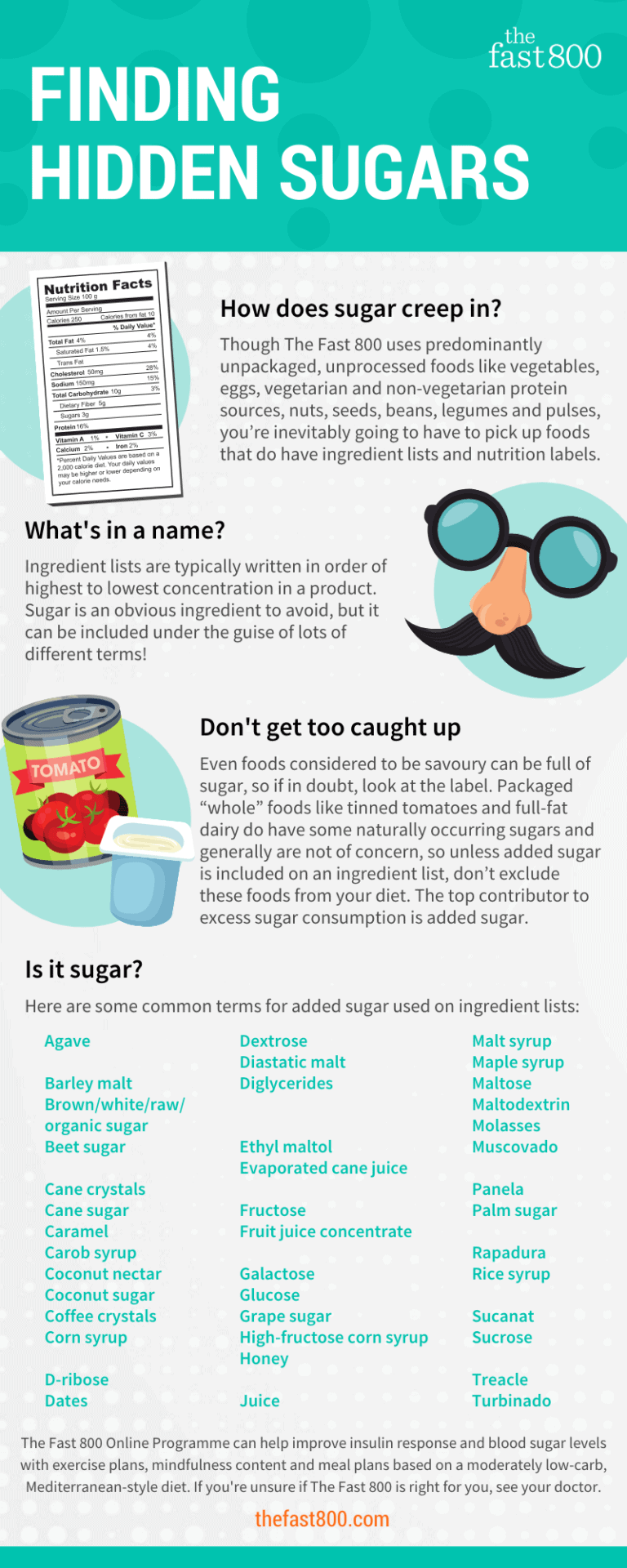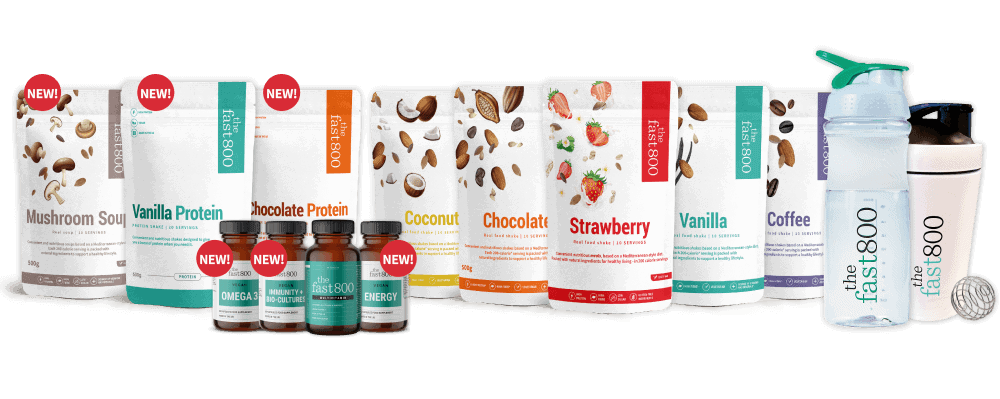Sugar Cravings: Are You Unknowingly Feeding Them?
One of the key philosophies of The Fast 800 is to improve blood sugar levels, which in turn improves body composition and overall health. However, the sweet stuff has a way of creeping into our diets in surprising ways, making it hard to shake off sugar cravings and see substantial progress.
The impact of sugar: Chronic disease
People who consume high-sugar diets are more likely to suffer from insulin resistance.1 When you become resistant to insulin, your body can struggle to use glucose as fuel, leaving it hanging around in the blood. High levels of glucose in the blood can be a causative factor in a number of serious cardiovascular diseases.2 Additionally, insulin resistance and poor blood sugar management are likely to leave you craving more sugar and remaining hungry, and you are likely to feel fatigued. Insulin resistance can present in polycystic ovary syndrome in some women, so controlling insulin response may therefore assist in managing PCOS.3 Insulin resistance may also pave the way to metabolic syndrome and type 2 diabetes, if left untreated.4
Metabolic syndrome is a cluster of conditions that includes raised blood sugars, high LDL (bad) cholesterol and excess belly fat, typically as a result of poor dietary choices and sedentary lifestyles.5 Those who do not manage their metabolic syndrome are more likely to experience chronic diseases, including stroke, heart attack, cardiovascular disease and type 2 diabetes.6 Insulin resistance and obesity links to the onset of metabolic syndrome. Reversing the condition is possible by reducing sugar and refined carbohydrate intake and increasing consumption of protein, fibre and healthy fats (just like we do on The Fast 800).
Type 2 diabetes affects a large number of the global population, with many being unaware they have the condition. If left undiagnosed or untreated, type 2 diabetes can lead to kidney failure and blindness, while significantly increasing your risk of cardiovascular disease.7 Excess sugar consumption can contribute to type 2 diabetes and continuing to eat a high-sugar diet can lead to serious consequences.
Gut microbiome balance
Diets high in sugar and processed foods can create an imbalance of the gut microbiome, which is the ecosystem of bacteria in your lower digestive tract.8 Every microbiome has a plethora of different bacterial strains, which – in healthy guts – coexist without causing much disturbance. However, a high-sugar diet can cause the balance of bacteria to shift, with proliferation of “bad” bacteria thriving off excess sugar.9 This can worsen sugar cravings and make it harder to break sugar addiction.
An imbalanced gut microbiome may contribute to systemic inflammation in the body, a factor to be considered in the development and exacerbation of chronic diseases. Additionally, poor gut microbiome can contribute to a number of undesirable digestive complaints, including bloating, flatulence and IBS.10
General wellbeing
Those who consume high-sugar diets are more likely to experience:
- Poor sleep quality;
- Irritability and mood swings;
- Fatigue;
- Hunger and cravings for poor-quality food choices;
- Fluid retention; and
- More rapidly ageing appearance.11
The Fast 800 online programme is designed to re-sensitise your body to insulin and reduce cravings. With a balance of exercise, a naturally low-carb Mediterranean-style diet and intermittent fasting, the online programme gives you the tools and guidance to begin reversing insulin resistance and freeing yourself of overwhelming sugar cravings

Following this way of eating for a good period of time has led to far less sugar cravings! I also find a number of things far too sweet now – icing on cakes, cake in general and any chocolate apart from dark! If I do fancy something sweet, I try to make sure I really want it before eating it. So, I’ll have a glass of water or a cup of tea, and rethink whether I really need something sweet. ” – Nia, The Fast 800 Health Coach
How to limit hidden sugars and reduce sugar cravings
When looking at labels, sugar is an obvious ingredient to avoid. Be aware, it can be included under the guise of lots of different terms! Usually, anything ending in “ose” is a giveaway, as are syrups and juices.
Understand food labels
Though The Fast 800 uses predominantly unpackaged, unprocessed foods like vegetables, eggs, vegetarian and non-vegetarian protein sources, nuts, seeds, beans, legumes and pulses, you’re inevitably going to have to pick up foods that do have ingredient lists and nutrition labels.
Even foods considered to be savoury can be full of sugar, so if in doubt, look at the label. Unless added sugar is included on an ingredient list, packaged “whole” foods like tinned tomatoes and full-fat dairy do still have some naturally occurring sugars and generally are not of concern, so don’t exclude these from your diet. Avoiding added sugar is key when following The Fast 800 and aiming to prevent chronic diseases.

Opt for full-fat dairy
Fat provides satiating flavour and texture in many foods, so removing it from products tends to require some clever meddling to recreate the original taste. Often, manufacturers do so by ladening low-fat products with additives and sugar.
Consuming full-fat dairy in moderate amounts, as on The Fast 800 online programme, is unlikely to contribute to the development of chronic disease, and in fact, consuming dairy alongside healthy fats like those in eggs, avocado, olive oil, nuts and seeds offers protective benefits.
Stick to a couple of small fruit serves per day
Whole pieces of fruit do contain some sugar, but are packaged up with fibre; fibre slows the release of glucose into the bloodstream. This means whole fruits are generally a better choice than tinned or dried fruits, and juices, but it’s easy to consume more than we should and crowd out room in our appetite for more beneficial foods richer in protein and phytonutrients.
If you really do want fruit without compromising your blood sugar levels, we recommend berries and hard fruits. Apples and pears can be consumed; eat as part of your meals and stick to no more than two to three portions per day
Artificial sweeteners aren’t that great, either
Choosing “diet” alternatives or products with artificial sweeteners won’t necessarily combat your sugar cravings. Many artificial sweeteners have a similar effect on the insulin response as sugar, so they may do more harm than good.
Additionally, relying too heavily on sweeteners can increase cravings for sweet things, so it’s best to reduce your intake. The Fast 800 online programme teaches you how to reduce your intake of sugar and sweet foods without compromising on flavour and variety, so you can start to incorporate naturally-sweetened foods (like fruit or The Fast 800 Shakes) without it being a slippery slope for your sugar cravings.
Additionally, most people who reduce their intake of sugar and sweeteners tend to find their taste buds adjust, and foods like vegetables start to naturally taste sweeter!
Where to start
If you’re finding it tough to avoid sugar, The Fast 800 meal plans, designed by our in-house nutritionist, can help. They provide plenty of flavour, fibre and at least 50g of protein per day to keep you feeling full. With options for vegetarians and non-vegetarians, the online programme offers meal plans for all The Fast 800 approaches.
Macdonald IA. A review of recent evidence relating to sugars, insulin resistance and diabetes. Eur J Nutr. 2016;55(Suppl 2):17-23. doi:10.1007/s00394-016-1340-8
Frier BM, Schernthaner G, Heller SR. Hypoglycemia and cardiovascular risks. Diabetes Care. 2011;34 Suppl 2(Suppl 2):S132-S137. doi:10.2337/dc11-s220
Salek, M., Clark, C., Taghizadeh, M., et al (2019). N-3 fatty acids as preventive and therapeutic agents in attenuating PCOS complications. EXCLI journal, 18, 558–575. doi:10.17179/excli2019-1534.
Goldstein BJ. Insulin resistance as the core defect in type 2 diabetes mellitus. Am J Cardiol. 2002 Sep 5;90(5A):3G-10G. doi: 10.1016/s0002-9149(02)02553-5. PMID: 12231073.
Rochlani Y, Pothineni NV, Kovelamudi S, Mehta JL. Metabolic syndrome: pathophysiology, management, and modulation by natural compounds. Ther Adv Cardiovasc Dis. 2017;11(8):215-225. doi:10.1177/1753944717711379
Saklayen MG. The Global Epidemic of the Metabolic Syndrome. Curr Hypertens Rep. 2018;20(2):12. Published 2018 Feb 26. doi:10.1007/s11906-018-0812-z.
https://www.health.harvard.edu/a_to_z/type-2-diabetes-mellitus-a-to-z
Singh RK, Chang HW, Yan D, et al. Influence of diet on the gut microbiome and implications for human health. J Transl Med. 2017;15(1):73. Published 2017 Apr 8. doi:10.1186/s12967-017-1175-y
Satokari R. High Intake of Sugar and the Balance between Pro- and Anti-Inflammatory Gut Bacteria. Nutrients. 2020;12(5):1348. Published 2020 May 8. doi:10.3390/nu12051348
Menees S, Chey W. The gut microbiome and irritable bowel syndrome. F1000Res. 2018;7:F1000 Faculty Rev-1029. Published 2018 Jul 9. doi:10.12688/f1000research.14592.1
Danby FW. Nutrition and aging skin: sugar and glycation. Clin Dermatol. 2010 Jul-Aug;28(4):409-11. doi: 10.1016/j.clindermatol.2010.03.018. PMID: 20620757.









